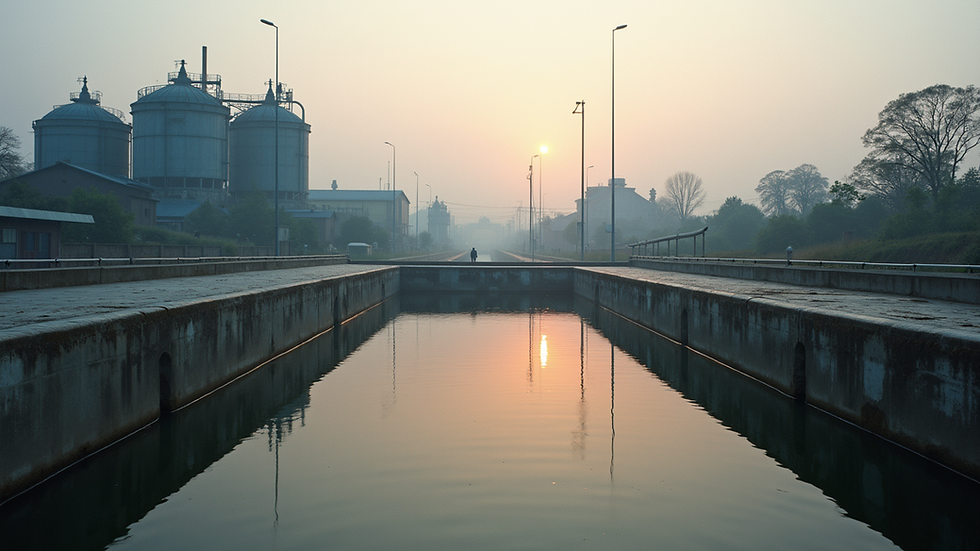Tackling Industrial Wastewater Challenges in India
- palwinder kaur
- Sep 19, 2025
- 3 min read
India's rapid industrial growth has brought significant economic benefits but also serious environmental challenges. One of the most pressing issues is the management of industrial waste, particularly wastewater generated by various industries. Effective industrial waste management is crucial to protect water resources, public health, and the environment. This article explores the challenges India faces in managing industrial waste, practical solutions, and examples of industrial wastewater to provide a comprehensive understanding of this critical issue.
Understanding Industrial Waste Management in India
Industrial waste management involves the collection, treatment, and disposal of waste produced by industrial activities. In India, industries such as textiles, chemicals, pharmaceuticals, and manufacturing generate large volumes of waste, including hazardous substances. The lack of adequate infrastructure, regulatory enforcement, and awareness often leads to improper disposal, contaminating water bodies and soil.
India's industrial waste management challenges include:
Inadequate treatment facilities: Many industries lack access to modern wastewater treatment plants.
Non-compliance with regulations: Some industries discharge untreated or partially treated wastewater.
Limited awareness: Small and medium enterprises often lack knowledge about sustainable waste management practices.
Financial constraints: High costs of advanced treatment technologies deter adoption.
Addressing these challenges requires a multi-pronged approach involving government policies, industry participation, and community engagement.

Strategies for Effective Industrial Waste Management
To improve industrial waste management in India, several strategies can be implemented:
1. Strengthening Regulatory Frameworks
The government must enforce stricter regulations and ensure compliance through regular monitoring. Penalties for violations should be significant enough to deter non-compliance. Encouraging transparency and public reporting can also motivate industries to adopt better practices.
2. Promoting Advanced Treatment Technologies
Industries should invest in modern wastewater treatment technologies such as membrane filtration, biological treatment, and zero liquid discharge systems. These technologies reduce pollutants and enable water reuse, conserving resources.
3. Capacity Building and Awareness Programs
Training programs for industry workers and managers can increase awareness about the importance of proper waste management. Sharing best practices and success stories can inspire wider adoption.
4. Financial Incentives and Support
Subsidies, low-interest loans, and tax benefits can encourage industries to upgrade their waste treatment facilities. Public-private partnerships can also mobilize resources for infrastructure development.
5. Encouraging Waste Minimization and Recycling
Adopting cleaner production techniques and recycling waste materials can reduce the volume of waste generated. For example, using by-products as raw materials in other processes minimizes environmental impact.

What are the examples of industrial wastewater?
Industrial wastewater varies depending on the type of industry and processes involved. Some common examples include:
Textile Industry Wastewater: Contains dyes, chemicals, and high levels of organic matter. It is often colored and toxic.
Chemical Industry Wastewater: May include acids, alkalis, solvents, and heavy metals.
Pharmaceutical Industry Wastewater: Contains active pharmaceutical ingredients, solvents, and other hazardous chemicals.
Food Processing Wastewater: Rich in organic matter, fats, oils, and suspended solids.
Metal Processing Wastewater: Contains heavy metals like lead, mercury, and cadmium.
Paper and Pulp Industry Wastewater: High in organic content, lignin, and bleaching agents.
Each type requires specific treatment methods to remove contaminants effectively before discharge or reuse.

Role of Technology and Innovation in Industrial Waste Management
Technology plays a vital role in overcoming industrial waste management challenges. Innovations such as:
Real-time monitoring systems: Sensors and IoT devices help track pollutant levels continuously.
Bioremediation: Using microorganisms to degrade hazardous substances naturally.
Advanced oxidation processes: Techniques like ozonation and UV treatment break down complex pollutants.
Resource recovery: Extracting valuable materials from waste streams for reuse.
These technologies not only improve treatment efficiency but also reduce operational costs and environmental footprint.
Collaborative Efforts for Sustainable Industrial Waste Management
Sustainable industrial waste management requires collaboration among various stakeholders:
Government agencies: Formulate policies, provide infrastructure, and enforce regulations.
Industries: Implement best practices and invest in treatment technologies.
Research institutions: Develop innovative solutions and conduct impact assessments.
Local communities: Participate in monitoring and awareness campaigns.
NGOs and international organizations: Support capacity building and funding initiatives.
By working together, these groups can create a sustainable framework that balances industrial growth with environmental protection.
Moving Forward: Building a Cleaner Industrial Future
India's industrial sector is poised for continued growth, making it imperative to address waste management challenges proactively. Embracing modern technologies, enforcing regulations, and fostering collaboration can significantly reduce the environmental impact of industrial activities.
For industries looking to improve their wastewater management, partnering with experts in industrial wastewater treatment can provide tailored solutions that meet regulatory standards and promote sustainability.
By prioritizing industrial waste management, India can safeguard its natural resources, protect public health, and ensure a cleaner, greener future for generations to come.



Comments